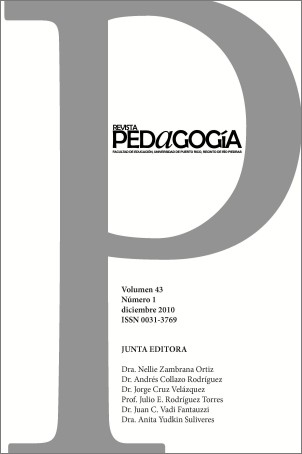Abstract
Telos is related to Aristotle, who derives it from botanic and zoology. He assumes that beings and things possess a natural aim that explain their behavior. In humans this objective is known as eudaimonia, translated as happiness, the happy life, the fulfulling life, among other definitions. Through education a person achieves his or her telos. Hostos also presents a teleological conception of humans, in which the completion of duty is the purpose towards which everyone should direct himself or herself. Similarly, it is by means of education that people achieve the moral development that leads to the realization of their purpose in life. Unlike Aristotle and Hostos, who assume the existence of a reality that determines the telos in human beings, Dewey opts for a light ontology, focused on the concept of experience. Experience does not possess preset specifications, since it is forged in the interaction between human beings and their surroundings.
How to cite:
Suárez-Silverio, E. J. (2011). El telos y la educación en Aristóteles, Eugenio María de Hostos y John Dewey. Pedagogía, 43(1), 75-103. Retrieved from https://revistas.upr.edu/index.php/educacion/article/view/16576
References
Aristóteles. (1942). La gran moral: Moral a Eudemo. Madrid: Espasa-Calpe.
Aristóteles. (2004). Ética Nicomaquea. México: Editorial Porrúa.
Beardman, S. (2007). The special status of instrumental reasons. Philosophical Studies, 134, 255-287. doi:10.1007/s11098-005-8878-2
Cagampang, R. A., & Gatela, M. (2009). The eudaimonia problematic: Aristotle‘s or Aristotelian? Philippiniana Sacra, 44(132), 505-544.
Dewey, J. (1929). The quest for certainty. New York: Capricorn Books.
Dewey, J. (1939). Theory of valuation. Chicago: The University of Chicago Press.
Dewey, J. (1955). Teoría de la vida moral. México: Herrero. (Trabajo original publicado en 1932).
Dewey, J. (1958). Experience and nature. New York: Dover Publications.
Dewey, J. (1960). Context and thought. En R. Bernstein (Ed.). On nature, experience and freedom (pp. 90-108). Indianapolis, Indiana: The Bobbs-Merrill Company.
Dewey, J. (1978). Democracia y educación. Buenos Aires: Editorial Losada. (Trabajo original publicado en 1916).
Dewey, J. (1980). Art as experience. New York: Perigee Books. (Trabajo original publicado en 1934).
Dewey, J. (1997). Experience and education. New York: A Touchstone Book. (Trabajo original publicado en 1938).
Dewey, J. (2000). La influencia del darwinismo en la filosofía. En Á. M. Faerna (Ed.). La miseria de la epistemología: Ensayos de pragmatismo (pp. 49-60). (Ensayo original publicado en 1909).
Hauskeller, M. (2005). Telos: The revival of an Aristotelian concept in present day ethics. Inquiry, 48(1), 62-75. doi:10.1080/00201740510015356
Hostos, E. M. (1991). Obras Completas (Edición Crítica). Ciencia de la pedagogía (Vol. 6). Río Piedras, PR: Editorial de la Universidad de Puerto Rico.
Hostos, E. M. (2000). Obras completas (Edición crítica): Tratado de moral (Vol. 9). Río Piedras, PR: Editorial de la Universidad de Puerto Rico.
Kekes, J. (1997). Moral wisdom and good lives. Ithaca, N.Y.: Cornell University Press.
MacIntyre, A. (2001). Tras la virtud. Barcelona: Ediciones Críticas. (Trabajo original publicado en 1984).
Poulsom, M. (2008). The pro‘s and con‘s of intelligent design. Forum Philosophicum, 13, 177-195.
Rojas, C. (2000). Obras completas (Edición crítica): Tratado de moral (Vol. 9, Estudio preliminar, pp. 23-86). Río Piedras, PR: Editorial de la Universidad de Puerto Rico.
Rorty, R. (1991). Contingencia, ironía y solidaridad. Barcelona: Paidós. (Trabajo original publicado en inglés en el 1989).
Taylor, C. (2006). Fuentes del yo: La construcción de la identidad moderna. Barcelona: Paidós. (Trabajo original publicado en inglés en 1989).
Taylor, C. (2007). A secular age. Cambridge, MA: The Belknap Press of Harvard University Press.
Urmson, J. O. (1988). Aristotle‘s ethics. Oxford: Blackwell Publishers.
The contents published in the Puerto Rico Journal of Education is freely distributed under open access practices, in accordance with the Creative Commons license, Attribution-NonCommercial 4.0 International (CC BY-NC 4.0). Through these principles, the journal and its authors allow readers to access, reproduce and share articles in full text. Users should give credit to authors in a reasonable way without suggesting they have their support. Under no circumstances, readers may make use of the contents for commercial purposes. The authors retain copyright on their works.

